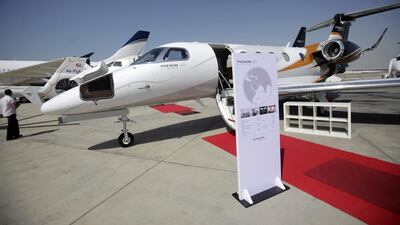The Embraer Phenom 300 was the aviation industry’s best-selling business jet across all segments in 2016, marking the fourth consecutive year of this achievement, the Brazilian plane maker said as it announced first quarter results on Tuesday.
The firm delivered 63 Phenom 300 jets in 2016, the highest volume of any business jet model, according to the General Aviation Manufacturers Association (GAMA), although deliveries fell in the first quarter compared with a year earlier, Embraer said.
In the first quarter Embraer delivered 18 commercial and 15 executive (11 light and four large) jets, down from the 21 commercial and 23 executive (12 light and 11 large) jet deliveries in the same period last year.
“In March, the first Phenom 100EV model was delivered in Melbourne, Florida to an undisclosed US customer and the 400th Phenom 300 was delivered to Elite Jets, an air charter/taxi company, recently established in Naples, Florida,” Embraer said.
The 400th Phenom 300 joins Elite Jets’ all-new Embraer aircraft fleet, now consisting of and four Phenom 300s and one Legacy 500.
Also in March, the company announced that it successfully completed the inaugural flight of the first prototype of the E-195 E2 commercial jet, several months ahead of schedule. Embraer said all three jet models of the E2 programme remain on track for their respective entry into service plans – the E-190 E2 in the first half of 2018, the E-195 E2 in the first half of 2019 and the E-175 E2 in 2021.
The company said its firm order backlog ended the quarter at US$19.2 billion, while first-quarter revenues were $1.02bn, a decline of 21.6 per cent as compared to 2016, due largely to a decline in commercial jet and executive jet deliveries, it said.
Adjusted earnings before interest and taxes and adjusted earnings before interest, tax, depreciation and amortisation margins were 3 per cent and 10.1 per cent, respectively, in the first quarter, it said. The figures exclude the impact of $7.6 million in additional provisions related to the company’s voluntary dismissal programme.
Net income attributable to Embraer shareholders was $42.5m, while adjusted net income (excluding the impact of FX-related non-cash deferred income tax and social contribution and the aforementioned provision) for the quarter was $23.2m.
The company’ said first-quarter deliveries are generally the weakest in terms of seasonality, and it remains confident in its 2017 guidance for 97 to 102 total commercial jet deliveries and 105 to 125 total executive jet deliveries (70-80 light jets and 35-45 large jets). Embraer invested a total of $117.1m in product development in the first quarter, it said, which was mostly offset by $86m in contributions from suppliers. The spending on product development, and also the contributions from suppliers, are related to the development of the E-Jets E2 commercial jet programme. The company said it expects spending to ramp as the year progresses to finish 2017 in line with its $400 million outlook for the year.
During the quarter, Embraer announced Brazil’s Azul as the launch operator for the E195-E2 and Norway’s Widerøe as the launch operator for the E190-E2. In January, Embraer signed a contract with Widerøe, the largest regional airline in Scandinavia, for up to 15 E2 jets. The Norwegian regional carrier will place the E190-E2 into service in the first half of 2018. Azul, the largest operator of the current generation E195s in the world, will fly the E195-E2 in the first half of 2019, Embraer said. The deal between Embraer and Azul was firmed in 2015 and is for up to 50 aircraft, consisting of 30 firm orders and 20 purchase rights.
During the first quarter, South Africa’s Airlink joined the E-Jet operator family. The airline is acquiring five E-Jets – three E170s and two E190s ―– from ECC Leasing, a wholly-owned Embraer subsidiary, as part of a planned growth and modernisation strategy. Airlink will start to receive the aircraft in the first half of 2017.
In the segment of commercial jets with 70 to 130 seats, Embraer said it maintains its lead with more than 50 per cent of the sales and 60 per cent of the deliveries in the world market.
chnelson@thenational.ae
Follow The National's Business section on Twitter

